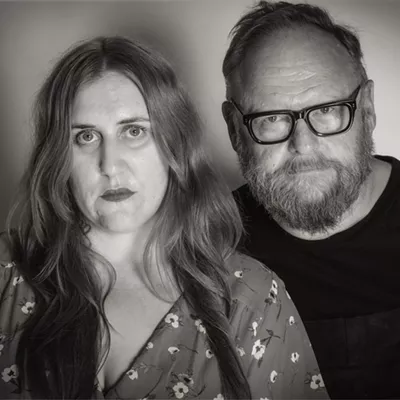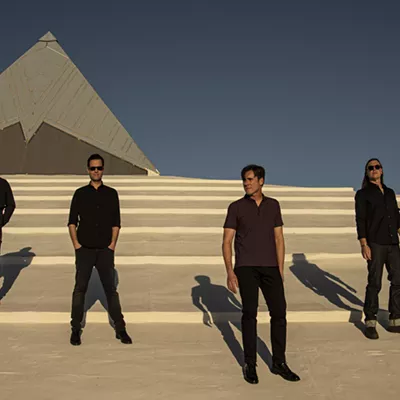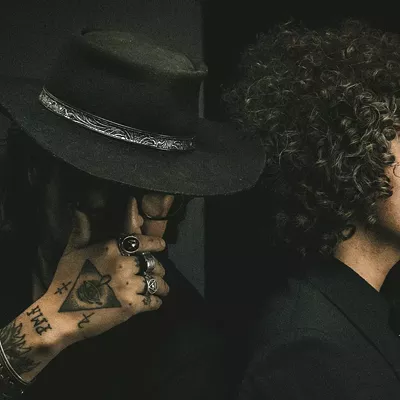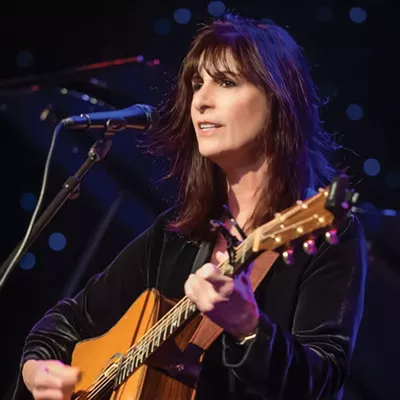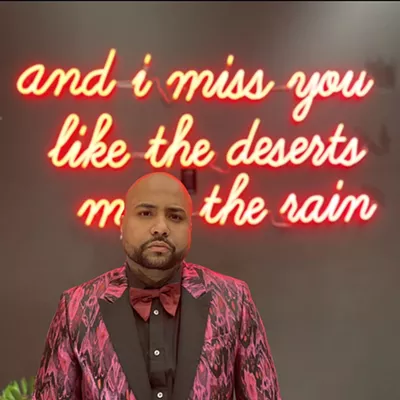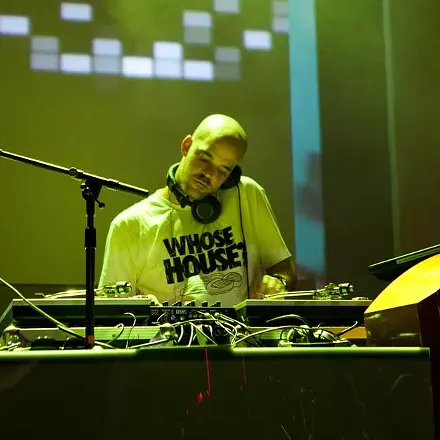But fortunately for Denver denizens, there's DeVotchKa.
DeVotchKa, who took their name from Anthony Burgess' novel A Clockwork Orange (it's the word main character, Alex, uses for "woman"), play soul-warming music infused with Old World Italian influences, with a dash of Mexican twang, a twist of Slavic edge and, of course, a little rock 'n' roll thrown in, to give it some heat. Fronted by songwriter, vocalist, trumpet and guitar player Nick Urata, DeVotchKa's sound is unlike anything you even think you've heard. Unless, of course, you've heard DeVotchKa.
The band has two records under their belt: 2000's Supermelodrama, and 2003's Una Volta, recorded here at Wavelab with Nick Luca and Craig Schumacher. Their live shows are energized assaults on numerous musical genres; the last time DeVotchKa played Tucson, in mid-October at Vaudeville Cabaret, the first few minutes of their set were hard to turn away from.
DeVotchKa's roots grow back to Chicago, where Urata lived for a turn, and spread to Denver, where the band has garnered critical acclaim from the news media. (Former Tucsonan and Westword writer Laura Bond called them "one of the most engaging live acts of the Denver/Boulder area"; the Denver Post voted them Colorado's Best Underground Band of 2002.) But the real roots of the music go even further back, to Italy, where Urata's family is originally from.
They say you can't escape where you're from, and you should write about what you know; these are the kinds of classic maxims that make DeVotchKa's music sear with an original edge--gypsy fiddles and Italian accordion (played by Tom Hagerman) combined with rockabilly guitar, bass lines and a pop sensibility: traditions transposed and transformed.
"I was treading water in the musical dissatisfaction," said Urata, "and so I found an accordion player and went back to the music I first heard in New York with my family."
Urata "grew up on a diet of rock and roll, just like every other American kid," but DeVotchKa's sound is what happens when that diet triggers a strange chemical reaction, creating songs like "Death by Blonde," on Una Volta, where the fiddle could be from a back alley in Russia and the guitar from a back alley in West Texas. A rendition of the Mexican traditional "La Llorrona," the last track on Una Volta, is haunting; the melody is traded back and forth between horns, a whistle and a violin. Urata admits an affection for spaghetti Westerns and the music associated with them; "Commerce City Sister" features a walking bass line (played by Jeanie Schroder, who also plays tuba) complemented by an accordion, with Urata's near-yodeling vocals. Toward the end, an acoustic guitar takes over, and a sad violin wavers in high registers; Urata mumbles the lyrics, something about whiskey and hearts. These songs are agile and flexible, like a well-fed flamingo: pink and beautiful and strange; they just might bite if provoked.
On Supermelodrama, cosmopolitan influences are used more sparingly than on Una Volta, which means the songs are more like antsy pop songs; the guitar takes precedence over the other instruments. Una Volta is much more horn- and fiddle-heavy than Supermelodrama, which Urata wrote mostly by himself. That, said Urata, was the biggest difference between the records; Una Volta was written with more help from the other multi-talented members of DeVotchKa: Hagerman, Schroder and drummer Shawn King (who also plays vibes and trumpet). And also, added Urata, "We knew at least some people were going to hear it."
DeVotchKa toured with locals Calexico in 2002 and were invited to record in Tucson at Wavelab.
"Tucson is the coolest place to make a record," said Urata. "We ate all sorts of great Mexican food and drank on Fourth Avenue."
Like Calexico, DeVotchKa applies creative instrumentations to their songs to create a dramatic, full-bodied musical experience; not only do you hear the record, you listen to it. When the first few notes of "Queen of the Surface Streets" begins--subtle, pretty arpeggios and violin chords--and Urata sings, "You're like a lovely hallucination; you get me through my current occupation," you can't help but feel the adoration. Urata's songs are swollen with sincerity, and the music enhances and echoes the sentiments; "My hands are raw from digging my own grave," he sings on "One Last Vow" while the string instruments chop and quiver.
"It goes ashes to ashes, from dawn till dusk, I am drowning in rhythms from oceans of lust," sings Urata on "Oceans of Lust"; the gothic images contrast with desperate cries of love and loss and are as haunting and careworn as the cobbled streets of an old European town. Most of us Americans are strange mixtures of all kinds of cultures--there's something in DeVotchKa's music that taps into that culture vein and makes you want to put on Grandma's old babushka and kick out your feet in a archaic frenzy.
Una Volta is a short little record; clocking it at 40 minutes, it flies by fast, dancing and spinning like a traveling circus sideshow. And like a circus sideshow, DeVotchKa rocks in unexpected and subtle ways, showing you something extraordinary, something grounded in this world, familiar yet unfamiliar enough to be intriguing.
"I want our music to (be) a great escape, (that) transports you to different, exotic, romantic places," explained Urata.

